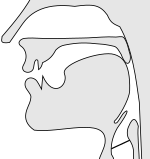| Voiceless uvular plosive | |
|---|---|
| q | |
| IPA Number | 111 |
| Audio sample | |
| Encoding | |
| Entity (decimal) | q |
| Unicode (hex) | U+0071 |
| X-SAMPA | q |
| Braille | |
The voiceless uvular plosive or stop is a type of consonantal sound, used in some spoken languages. It is pronounced like a voiceless velar plosive [k], except that the tongue makes contact not on the soft palate but on the uvula. The symbol in the International Phonetic Alphabet that represents this sound is ⟨q⟩, and the equivalent X-SAMPA symbol is q.
There is also the voiceless pre-uvular plosive[1] in some languages, which is articulated slightly more front compared with the place of articulation of the prototypical uvular consonant, though not as front as the prototypical velar consonant. The International Phonetic Alphabet does not have a separate symbol for that sound, though it can be transcribed as ⟨q̟⟩ or ⟨q˖⟩ (both symbols denote an advanced ⟨q⟩) or ⟨k̠⟩ (retracted ⟨k⟩). The equivalent X-SAMPA symbols are q_+ and k_-, respectively.

